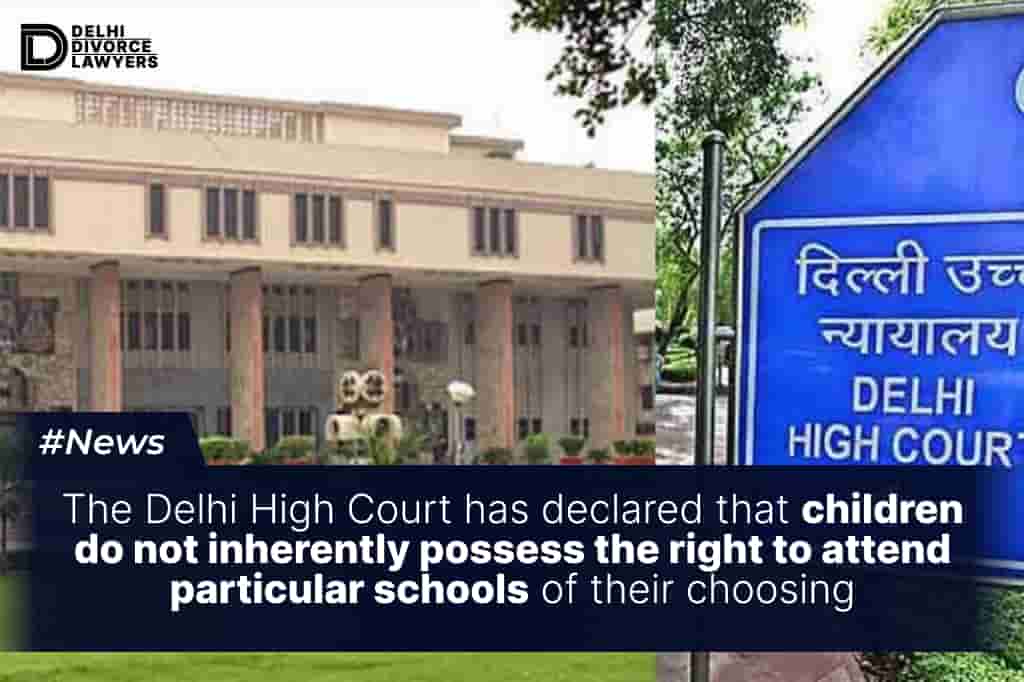The Delhi High Court determined that children do not possess an inherent entitlement to select a specific school for their education. It emphasized that while Article 21A of the Constitution and Section 12 of the Right to Education Act, 2009 (RTE Act) guarantee free and compulsory education up to the age of 14, they do not designate any particular institution for this purpose. This verdict was rendered in response to a writ petition filed by the mother of a 7.5-year-old girl against Maharaja Agrasen Model School.
A Single Bench of Justice C. Hari Shankar observed, “Absent such application, holding of a computerized draw of lots and shortlisting of a child for admission to a particular class in a particular school, no right to seek such admission enures in favour of the child. The right available under Article 21A of the Constitution or under Section 12 of the RTE Act is only to free and compulsory education till the age of fourteen, not for being provided such education in a particular school.”
The petitioner, Jiya, born in 2016, was approximately 7.5 years old and qualified as part of the Economically Weaker Section (EWS) of society. On Jiya’s behalf, her mother applied to the Directorate of Education (DoE) for admission under the EWS category in Class I for the academic year 2022-23. Subsequently, following a computerized draw conducted by the DoE, Jiya was selected for admission to the relevant school.
However, despite her mother’s persistent visits to the school, Jiya’s admission was declined by the institution. Her mother then sought the intervention of the DoE to facilitate Jiya’s admission, but these efforts proved unsuccessful. Consequently, Jiya, represented by her mother, filed a writ petition seeking a writ of mandamus to compel the school to admit her as an EWS student in Class II for the academic year 2023-24.
The High Court after hearing both sides noted, “No child, without her application suffering the rigour of this exercise, can directly claim a right to be admitted to a particular class in a particular school in a particular year as an EWS student. … The right guaranteed to every child under Article 21A of the Constitution or under the RTE Act is only for free and compulsory education till the age of fourteen. … That right would arise only if the child applies to the DoE as an EWS student for admission in the entry level class for that year and is shortlisted therefor, in the computerized draw of lots conducted by the DoE.”
Moreover, the Court stressed that the girl’s eligibility for admission to Class I at the respondent school for the academic year 2022-23, as determined by the Directorate of Education (DoE), does not inherently guarantee the same right indefinitely into the future.
“The court emphasized that each academic session commences anew. A child who, for any reason, fails to secure admission as an EWS candidate despite being shortlisted by the DoE for a particular academic year, and allows that year to elapse without taking any legal action, cannot assert an enforceable right to admission in the subsequent academic year or in a higher class solely based on the prior shortlisting. The court highlighted that there is no automatic carryover of rights from one academic year to another, either within the same class or to a higher class. It further noted, ‘Rights, it must be appreciated, extinguish with time.'”
The Court upheld that the directive communicated via email from the Directorate of Education (DoE), instructing the respondent school to admit the girl on the same day, lacks legal validity and cannot be enforced.
“By 13 April 2023, the 2022-23 academic session had come to an end. With it, it must unfortunately be said, perished Jiya’s right to admission as an EWS student in the Respondent 2 school as well. Beyond that, Jiya’s right to education under the RTE Act, or under Article 21A of the Constitution, is only for being educated till the age of 14, and not for being educated specifically in the Respondent 2 school”, it added.
The Court observed that Section 32 expressly permits individuals who have concerns regarding a child’s rights under the RTE Act to file a written complaint with the local authority.
“I do not know whether the petitioner has made any such complaint. Assuming she, through her parent(s), has done so, the complaint would be dealt with in accordance with law. Section 32(1) cannot entitle Jiya to admission to Class II in the Respondent 2 school, for which she never approached the DoE in the first place, as an EWS student”, it added.
The Court observed that the application submitted for the academic year 2022-23, along with the subsequent allocation of the petitioner to the respondent school through the computerized draw conducted by the Directorate of Education (DoE), has regrettably become irrelevant.
The Court determined that failing to protect Jiya’s educational interests, as guaranteed by Section 12 of the RTE Act and Article 21A of the Constitution, would be inconsistent. These provisions secure Jiya’s entitlement to education as an EWS student until the age of fourteen, and no further.
“Jiya does not hold the entitlement for admission to Class II in Respondent 2 school as requested. Consequently, this plea must be dismissed. However, the DoE will strive to facilitate Jiya’s admission as an EWS student in Class II at an alternative school. This process should be conducted promptly, ensuring completion within four weeks from the date of this ruling,” the court decreed.
Accordingly, the High Court disposed of the writ petition.

